
[ad_1]
Microsoft is reported to be capitalizing on the success of ChatGPT by integrating the AI chatbot into its search engine Bing. But what might that look like? We may now have some idea, thanks to Bing users who said a new, AI-assisted version of the search engine mysteriously appeared (and disappeared) earlier today.
Student and designer Owen Yin reported seeing the “new Bing” on Twitter this morning. He told The Verge via Twitter DM that he has Bing set as his homepage on Microsoft’s Edge browser and the new UI just loaded up. “Didn’t do anything to find it,” said Yin. “After a couple of minutes it stopped working … Jaw dropped when I realized what I was looking at!”
(The Verge has been unable to verify the authenticity of these screenshots and Microsoft declined to comment on the validity of these apparent leaks.)
Yin was able to briefly test the system and shared further details about the integration in a blog post on Medium. He noted that the chatbot could not only answer questions but ask them in a conversational manner.
The new Bing can also apparently cite its sources. This is an important feature, as the inability of language models like ChatGPT to describe where their information is sourced from makes them less reliable.
Yin isn’t the only one who says they encountered a new Bing today either. At least two others reported receiving access to the updated search engine on Twitter before it disappeared.
Screenshots of the AI-augmented Bing show a new “chat” option appearing in the menu bar next to “search.” Select it and you’re taken to a chat interface that says, “Welcome to the new Bing: Your AI-powered answer engine.” There are three suggestions below: that users “ask complex questions,” “get better answers,” and “get creative inspiration.” And there’s a disclaimer: “Bing is powered by AI, so surprises and mistakes are possible. Make sure to check the facts, and share feedback so we can learn and improve.”
All this looks similar to the UI for ChatGPT itself, which also offers suggestions on how to best use the AI chatbot, as well as a warning that its answers may not be reliable.
This latter point is key when thinking about how AI language models could be useful for search. It’s well-known that these systems “hallucinate” with some frequency (that’s AI talk for “make up stuff”) and experts warn that their integration into search engines will almost certainly deliver false information. The question is whether that information might be dangerous also. If these systems go live without proper safeguards, they could offer harmful medical advice, for example, or racist or biased versions of history. Such content can already be found on the internet, but it’s not delivered with the authority of AI.
Despite these potential problems, the explosive popularity of ChatGPT seems like it’s encouraging both Microsoft and Google to accelerate plans for their AI-assisted future. Microsoft is reportedly going to be announcing a new version of Bing in the coming weeks, while Google has an event scheduled next week discussing upcoming AI work.
Additional reporting by Tom Warren.
[ad_2]